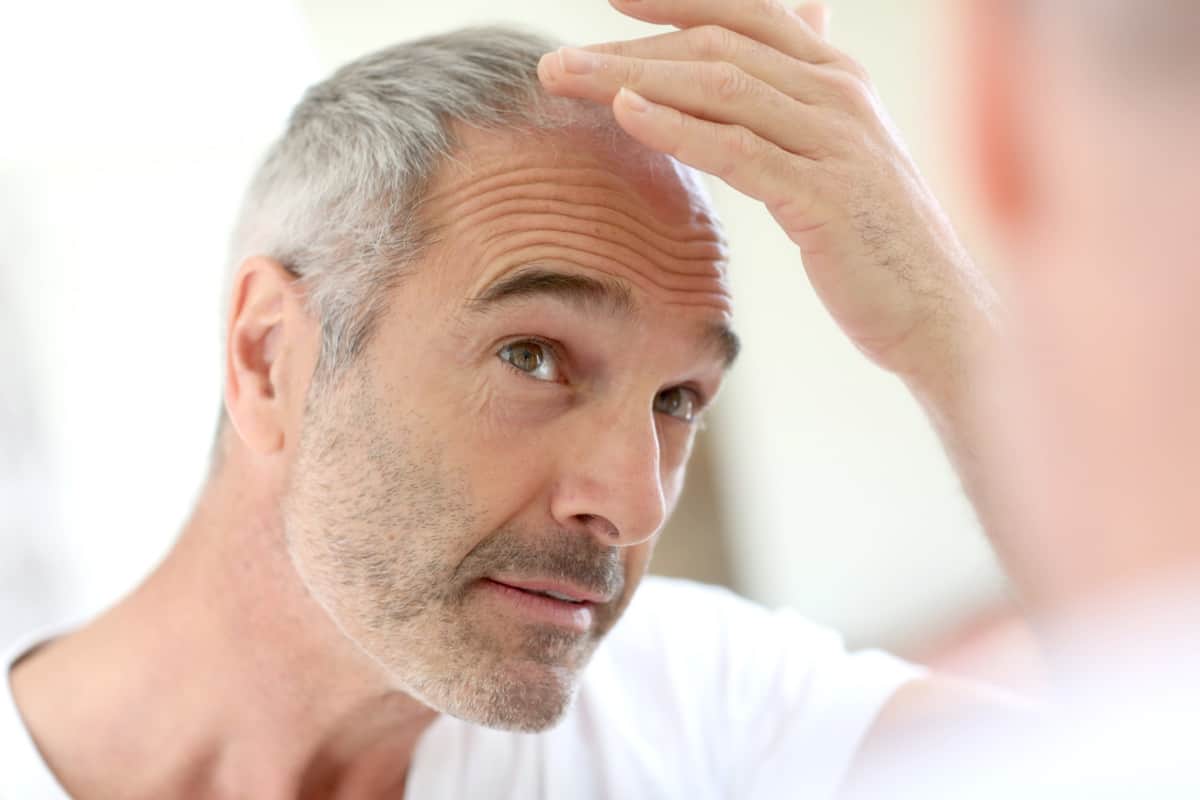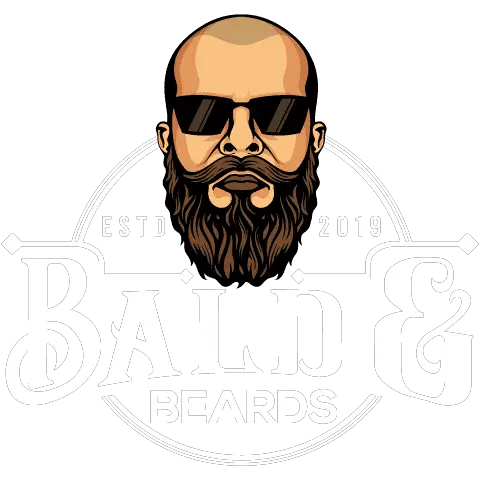Suffering from dry scalp? Maybe it’s dandruff, hormone production, or a hair product irritating your skin. While it’s true hormones can cause dry scalp and flakes, you may find relief with a simple hair & scalp home remedy using coconut oil.
Dry scalp is typically caused by stress, vitamin deficiencies, hormones, poor diet, or conditions like psoriasis or seborrheic dermatitis.
If you constantly itch your head and suffer from hair loss, you may have an irritated scalp, causing dryness and soreness. We explore the causes of dry scalp and how to treat this common skin condition.
What Causes Dry Scalp?
Studies have shown people suffer from dry scalp for various reasons. One of the most common is dehydration, which causes the skin to be drier all over, and present in a dry, itchy scalp. While other causes include changes in weather, hormones, or skin reaction to hair products.
Common Causes
- Psoriasis
- Eczema
- Vitamin C, B6 and B12 deficiency
- Seborrheic dermatitis
- Contact dermatitis
- Stress and anxiety
- Dehydration
- Hormone production increasing sebum production
- Wash your hair too often or with a harsh ingredient like sulfates
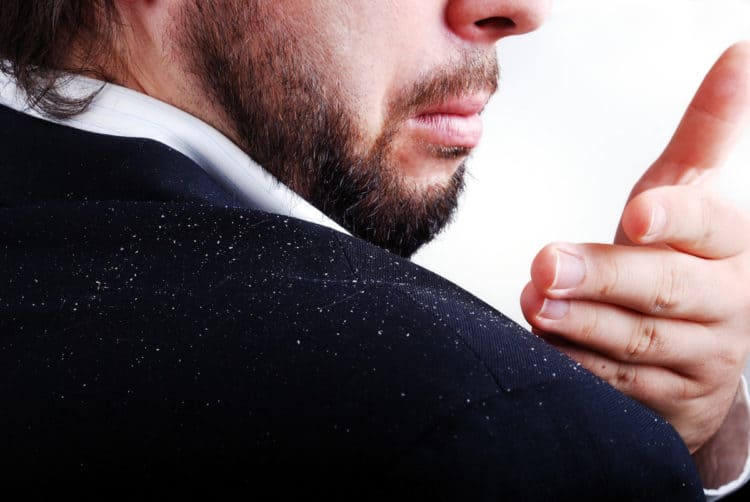
As your scalp becomes drier, you may see small white flakes. Scratching fingernails irritate the scalp’s epidermis, opening pores, disrupting hair follicles, and causing hair loss.
In many cases, a dry scalp is curable. But, if you can’t find the root cause, it could be a never-ending battle against agitation, itch, and flakes. Always seek medical advice if your condition persists, worsens or experience product side effects.
Dietary Deficiency
One major cause of dry skin is vitamin B deficiency, specifically B6 and B12. It’s important to boost these vitamins through your diet by eating foods rich in selenium, flaxseed oil, and zinc.
In addition, vitamin C deficiency can also result in a dry, itchy scalp. Mandarin oranges, kiwi, guava, lemon, grapefruit, and cauliflower are rich in vitamin C and should be part of your diet.
Stress
According to dermatologists, stress is a big factor contributing to dry skin, especially if you have oilier skin that suddenly dries out due to stress. Hormone levels respond to your cortisone output, so if you experience more stress suddenly, your skin is likely to show the effects.
Stress can also cause hair loss, which leads to shedding and itching. Many people who’ve gone on diets, such as the keto diet, may have to deal with a dry scalp due to the sudden change in their diets. However, if you eat more fruits and vegetables rich in B vitamins and vitamin C, you may be able to help your skin.
Dry Scalp is Common
Many people have experienced dry scalp. Studies show most experience a dried scalp in their teens and 20s. However, it’s less common in adults over the age of 50 and more common in men.
Have a dermatologist test for skin conditions like seborrheic dermatitis and scalp psoriasis, as these may be more difficult than treating dandruff. Some conditions require a prescription for medicated creams or tablets to help your skin hydrate and cure dry scalp for good.
Dandruff vs Dry Scalp
Dandruff and dry scalp exhibit similar symptoms such as small white flakes and an itchy scalp, so it’s easy to confuse the two very different conditions. With dandruff, the scalp becomes too oily, causing an excess buildup of skin cells that shed off. With a dry scalp, the skin becomes irritated and flakes off. Both are easily treatable at home.
When you see flakes in your hair, you may automatically assume its dandruff. However, dry scalp may also cause smaller white flakes.
The first difference between dandruff and dry scalp includes the size and color of flakes. Compare the symptoms between the two below.
Dandruff vs. Dry Scalp Symptoms
Let’s look at the differences between dandruff and dry scalp, including visuals. These are different conditions where dandruff can typically be treated with a dandruff shampoo.
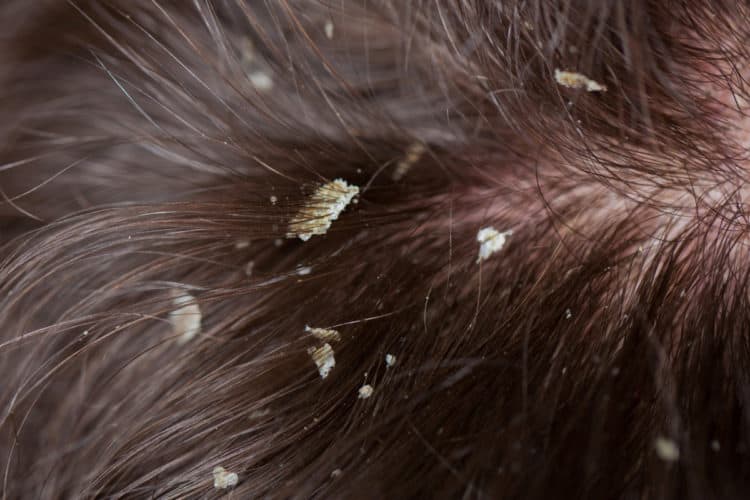
Dandruff Symptoms
Like any skin, our scalp sheds dead skin cells naturally. Too much shedding leads to dandruff flakes.
- Large, yellow and white flakes
- Flaky scalp, eyebrows, groin, and armpits
- Red, oily, scaly skin
- Itchy scalp
Products like Head & Shoulders help fight dandruff but may also require Dry Scalp Care Conditioner for dry scalp.
Dry Scalp symptoms
Despite similarities, dry scalp and dandruff are different and have unique symptoms. For those experiencing dry scalp and shave their heads, look into treatments for bald dandruff.
- Small, dry white flakes
- itchy scalp
- Dry skin in other areas
While dry scalp may combine with dandruff, you can see the difference in the shape, size, and color of flakes. If yours are small and white, you likely need a scalp moisturizing treatment.
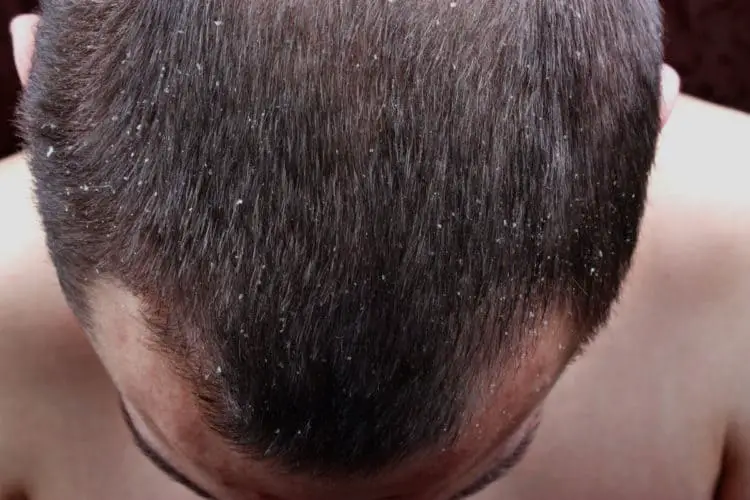
To treat dry scalp, sufferers must first understand the problem of drying out their skin. This could be anything from a medical condition to not drinking enough water to using a shampoo that irritates sensitive skin.
How Do I Treat Dry Scalp?
They’re a few ways to treat dry scalp and get relief, if not a combination of factors.
A good first step is to use a good dandruff shampoo like Head & Shoulders with zinc or Selsun Blue with selenium sulfide, which rids the scalp of the fungus causing dandruff. We discuss other shampoos below.
Treat the cause
Dehydration
If you drink caffeinated sodas, coffee, and teas without drinking pure water, you could be dehydrating your body even more. It’s important to get at least eight 8-oz glasses of water. This is also known as the “8×8 water rule.”
Vitamin or Mineral Deficiency
If you don’t get enough iron, vitamin B6, vitamin B12, zinc, vitamin C, or biotin, your scalp could dry out faster and start to itch. It’s best to start taking a multivitamin or fortifying your diet with more fruits and vegetables (see our guide: food for hair growth).
Skin Condition
Psoriasis, eczema, and seborrheic dermatitis can have similar symptoms to dry scalp. However, these are more prone to larger, yellow or white, oily flakes.
Stress
Has something changed drastically about your job, diet, or lifestyle? You could be causing some unnecessary stress. Try meditation, aromatherapy, exercise, or yoga to manage stress.
Allergic Reactions and Sensitive Skin
There may be chemicals in shampoos, conditioners, and hair products that can cause dry scalp, especially if you use them daily. Paraphenylenediamine (PPDs), sulfates, and petrol chemicals can cause significant issues with a dry scalp. We suggest changing your shampoo and conditioner to a gentle, moisturizing treatment instead.
In many cases, moisturizing shampoos can help rejuvenate your scalp, but if you have persistent dry skin, you may need a stronger treatment so always consult your doctor.
Treatments and remedies
To help dry scalp, experts recommend shampoos, home remedies or a combination of oils and holistic methods.
Coconut Oil
As both an antibacterial and antifungal, coconut oil is one of the best ways to moisturize your scalp. It also treats problems like atopic dermatitis quite quickly. You can find coconut oil at almost any drug store.
Tea Tree Oil
Another antifungal, antiseptic, and antibiotic treatment. Tea tree oil is helpful for dry scalp and relieves symptoms quickly. Most pharmacies have it, but it’s also available on Amazon and may be combined with coconut oil or olive oil for more effectiveness.
Aloe Vera: If you’ve used aloe vera for sunburns, then you may already know its benefits for dry scalp. Shampoos and hair creams with aloe vera have healing properties and will moisturize your skin, easing dry skin and flakes.
Apple Cider Vinegar
As an antimicrobial, apple cider vinegar works well to get rid of fungi and bacteria. It also soothes dry scalp itch. We recommend mixing one part apple cider vinegar with two parts water, then massage into your scalp. Rinse out after five minutes and do your shampoo and conditioner routine.
Medicated Shampoos
There are various shampoos that work best for dry scalp according to dermatologists.
- LivSo Moisturizing Shampoo (xlyitol to fight yeast)
- Head & Shoulders, DHS Zinc Shampoo (pyrithione zinc – antifungal)
- Selsun Blue (Selenium sulfide)
- Nizoral (Ketoconazole – OTC or prescription)
- Neutrogena T/Sal (Salicylic acid)
- Neutrogena T/Gel (Coal tar)
It’s important to only use shampoos and conditioners with gentle ingredients while working out a solution. You may have to switch to an anti-dandruff shampoo or moisturizing shampoo to strengthen your scalp.
Enhancing Your Diet
Dermatologists recommend adding more fruits and vegetables to your diet daily, including red meat or fatty fish such as salmon. In addition, vegetables like broccoli, kale, spinach, Brussel sprouts, and cauliflower are rich in vitamins and minerals helpful for your skin.
Diets high in sugar and processed food also have bad fats that increase the output of scalp oils, which leads to more flakes.
Other diets rich in biotin, zinc, and other B vitamins are also beneficial for hair growth and easing dry scalp. Egg yolks, tomatoes, and carrots are rich in biotin, while oysters, pumpkin seeds, and crab are rich in zinc.
It’s a great idea to move towards a protein- and plat-based diet, including Paleo recipes with an emphasis on red meat or salmon and leafy greens.
What Foods Help Dry Scalp?
There’s some evidence that diets high in sugar can have a significant effect on skin, and one of the first symptoms of diabetes is dry scalp and dandruff.
Foods to Include in a Dry Scalp Diet
- Salmon or tuna (omega-3 fatty acids)
- Canola oil
- Soybeans
- Pumpkin seeds
- Walnuts
- Flaxseed oil
- Eggs
- Oranges
- Yogurt
- Sweet potatoes
- Kale and spinach
- Tofu
- Red meat
- Poultry
- Strawberries
- Almonds
How Do You Hydrate Your Scalp?
We’ve researched several ways to alleviate dandruff and dry scalp, but the best method we’ve found to hydrate a scalp is through hair oil.
A few scalp serums, creams, lotions, and oils that moisturize and relieve dry patches of skin on your scalp. We recommend the following products:
- Soothing Scalp Oil by Eczema Honey
- Scalp Lotion by Kamedia
- Coconut oil
- Argan oil
- Kiehl’s Magic Elixir Hair Restructuring Concentrate
- Rose Hair and Scalp Moisturizing Masque by Aesop
- Vinegar Shine Rinse with Chamomile by Khlorane
Look into argan oil hair masks if you need additional moisture. These are best done weekly until dry scalp is gone.
Is Head & Shoulders Good for Dry Scalp?
Head & Shoulders is a brand offering many anti-dandruff and dry scalp treatments, including shampoos, conditioners, and creams. They make some with zinc to cure dandruff, while others are gentler and created specifically for dry scalp.
- For dandruff, try Head & Shoulders Classic Clean Anti-Dandruff Shampoo.
- For dry scalp, try Dry Scalp Care or Dry Scalp Care with Almond Oil.

